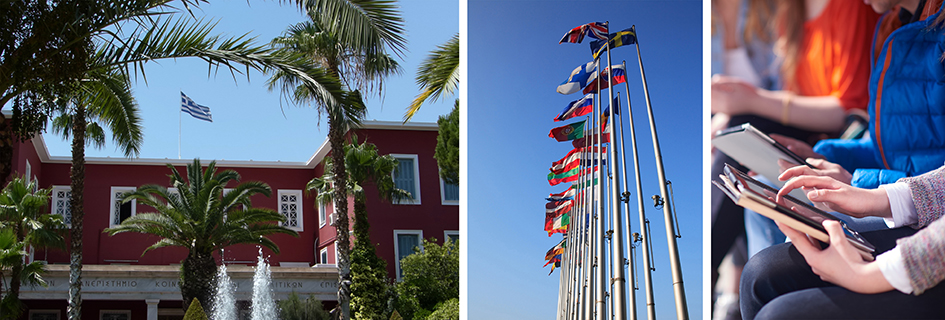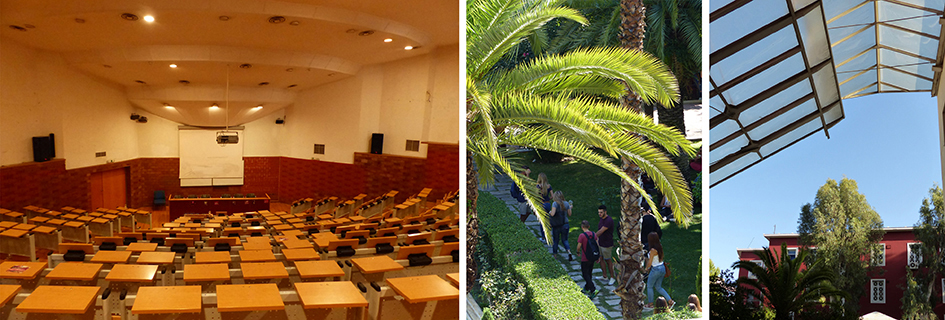but also the Greek national identity and recognition. Our international strategy shifts the fields of our academic visions in the field of our daily practices and incorporates every sense of European Integration with respect to the historical tang of every partner. We are trying not only to avoid the hazard of misguided reception of every action of International Programme that perceives the European integration only as technological completion (characteristic of the European North), but also to simplify operations (characteristic of the European South) that hinder the operational efficiency. It’s clear that we select our partners according to academic and other functional criteria, meaning that the cooperation with open-minded partners leads to sustainable and balanced outcomes for both parties. Moreover, we prefer partners that carry academic, functional characteristics and good practices that we would like to trade and to challenge in our space, integrating them in our mentality in the profit of our Institution. Considering that Panteion University constitutes an Institution of Social and Political Sciences, functions within conditions of social fragility, because of the great changes that have occurred during the last years, we consider that the diversity of our Institutional Partners regarding the geographic place could contribute ultimately to safe conclusions for many issues referring to the fields of Social, Political and Economic Sciences.

During a period of deep crisis in the European continent that many fields are highly affected, the University promotes fundamental values (human being, European integration) and that is not just an occurrence but under the authority of the Convention of Lisbon focusing on the establishment of principles and values with respect to the International Legal Order. Through the exchanges, especially the teaching mobility, the learning outcome is the current descent of values concerning the expansion of the democratic deficiency that refers to the function of the communal institutions, the emasculation of Social Europe, as well as the disputation even of the traditional values and principles in the operation of the united market. And all the above occur whilst the European Union is challenged in the field of the outer action, encountering humane crisis, issues related to the development of the Third Countries, consequences deriving from the Arabic Spring, cooperation of the United Nations as well as of other International Institutions, so that an International Order of peace, justice, democracy, human rights, state of Law and virtual governance be promoted. The above mentioned values are faithfully served by our University for many years through the Study Programmes on an undergraduate and a postgraduate level. Therefore, it’s really important, even more than it used to be, the promotion of relations and multilateral partnerships that take into consideration the neighbouring surroundings of Europe (European Mediterranean Cooperation, European Policy of Neighbourhood, development of new structured educational programmes and cooperation that can respond to the future challenges of Higher Education and traineeships in enterprises/ work placements, etc). As a consequence, it’s clear that the promotion and improvement of the relations within the states of Balkan and the region of Eastern Europe and the Mediterranean region, Russia including. Through this angle, the selection of our Partners takes under consideration beyond the academic characteristics, elements respective to our mentality or of equivalent priority. Moreover, we take under consideration the possibilities of research and specialization that are offered in all three cycles. As a result, our Institution is willing to participate in the development of joint degrees and other academic actions within the frame of LLP/Erasmus. We have already commenced the procedure of discussion and disciplinary negotiations with other European partners of the Mediterranean Area, such as Cyprus, in order to establish joint degrees. This action will enforce and complete the already existing academic activities, such as Cooperation with other European Institutions in terms of exchanges and supervision of post-graduate and doctorate level students.

The horizontal development of complicities among Partner Institutions aiming to the configuration of common actions, programmes and degrees as well as mutual integration of Professors and students in the Study Programmes of the Partner Universities, for the purpose of the attainment of a common objective, the European dimension in the field of education and finally the lamination of a the European awareness and the integration in the European Institutions. This policy can be served in the organizational and the operational level not only with centralized meetings orientated to geographical terms, but also with workshops of various scientific subject areas. We consider that the fundamental pillars of our strategy can be implemented on well organised projects that will substitute the already existing ones. To clarify, to the profit of the European cohesion, it’s essential that the administrative staff members that constitute the main corpus of the International Relations Offices can participate actively in workshops focused on different subject areas that are shaped according to geographical criteria. The above is mentioned because we consider as extremely essential the formulation of such workshops, since the policies as well as the obstacles that the Erasmus Offices face daily are common per geographic region (North, South, Eastern Europe, Balkans etc). As far as our Institution’s Strategy regarding the support arrangements for incoming mobile participants is concerned, we are obliged to reconsider our privileges policy towards Erasmus incoming students and to establish a new accommodation system, not abandoning the previously given privilege, but substituting it with another less costly support, due to the feeble financial competence.

The participation in the program affects positively our Institution’s modernization and enhances the value and the quality of the five priorities of the Modernization Agenda, helping us achieve our intended policy objectives. Since Greece is characterized by a high number of Bachelor Degree graduates, one of the main expected impacts is their further increase, focusing on avoidance of discrimination among social differentiations in either financial or sexual terms. Based on this orientation, our Institution adopts a stricter requirements system in order to ameliorate the quality level of our study programs or placements as well. As a result, our participation in the Program will lead in a positive way to the achievement of high-skill occupations from the part of our graduates and researchers. Furthermore, the fundamental changes of study programmes will result in the compatibility of our Degrees with the scientific research and European market. To clarify, aiming to Joint Degrees and cohering the structure and the scientific context of the study fields, we remain to our scientific identity, nevertheless, we explore and develop our scientific subsistence in the frame of any kind necessity, political, financial, social that market demands. Therefore, there is no doubt that consequently the qualitative cooperation in the fields of research and market will emerge from the knowledge and the skills that derive from the cohesion of the study programmes. Additionally, the widely expressed strong interest of our Institution for highly qualified staff members, focusing on using e-governance, internet, social media, so as to minimize bureaucracy, has derived from our participation in the programme and has become one of the dominate factors that define our institutional policy. In accordance with the above mentioned strategy guidelines, our Institution gives priority to the motivation and the development of the administrative staff mobility, in order to exchange good practices among partner Institutions, in the prospect of improving the collaboration and the learning/ training/ teaching outcomes. Our participation in the Programme has already had an impact on the Institutional financial policy which nowadays encourages the participation in International Weeks and support fundraise for promotion and info dissemination concerning the programme.







